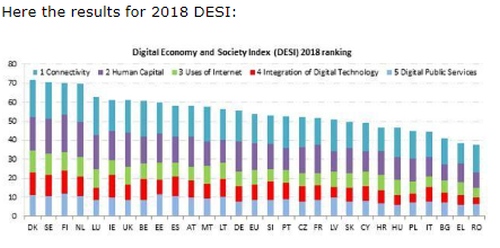Analytics, EU – Baltic States, Internet, Technology
International Internet Magazine. Baltic States news & analytics
Saturday, 20.04.2024, 00:25
Latvia ranks behind Lithuania and Estonia in EU Digital Economy and Society Index 2018
 Print version
Print versionThe internet website of DESI Index says that Latvia has progressed in line with the EU average. Progress has been driven by improvements in connectivity — both coverage and take-up of ultrafast broadband are relatively high — and in digital public services — due to the launch of the national data portal as well as the life events approach being adopted in the provision of public services. More and more Latvians are using internet banking and eGovernment services, but half of the population has no or low digital skills. Improving citizens’ digital skills is necessary for Latvia to benefit from an inclusive labor market, as well as for improving the productivity of businesses, which make only limited use of digital.
The European Commission says that in 2017 Latvia made good progress in the connectivity dimension at a pace similar to the EU average. The country is stagnating as regards fixed broadband coverage of households, still lagging behind the EU average (ranked 24th, with 93% household coverage).

Remarkably, almost all coverage is NGA (91% of households covered), and a large part is even ultrafast broadband (88% of households covered), where Latvia stands among the leading Member States, far above the EU average.
4G coverage in Latvia is also very high (98% of households). Take - up of fast and ultrafast broadband are also well above the EU average: 42% and 35% of homes subscribe to fast and ultrafast broadband respectively, as opposed to 33% and 15.4% on average in the EU. However, overall fixed broadband take-up in Latvia remains below the EU average, despite a small increase in 2017. This is to some extent compensated by a much more rapid increase in mobile broadband, thanks to data bundles being widely available at affordable prices.
The first five positions in this year’s DESI Index are taken by Denmark, Sweden, Finland, the Netherlands and Luxembourg, but on the bottom of the list are Poland, Italy, Bulgaria, Greece ad Romania.
Of the Baltic states, Estonia ranked 6th, and Lithuania ranked 13th.








 «The Baltic Course» Is Sold and Stays in Business!
«The Baltic Course» Is Sold and Stays in Business!

